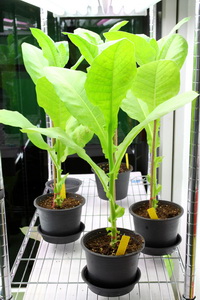
Tobacco Enzymes Inactivated via Multiplex CRISPR-Cas9 Strategy
April 19, 2017| |
 Plants or plant cells can be used to produce pharmacological glycoproteins such as antibodies or vaccines. However, these proteins carry N-glycans with plant-typical residues, which greatly impact the effect or activity of the protein. Two enzymes are responsible for the addition of plant-specific glycans: β(1,2)-xylosyltransferase (XylT) and α(1,3)-fucosyltransferase (FucT).
Plants or plant cells can be used to produce pharmacological glycoproteins such as antibodies or vaccines. However, these proteins carry N-glycans with plant-typical residues, which greatly impact the effect or activity of the protein. Two enzymes are responsible for the addition of plant-specific glycans: β(1,2)-xylosyltransferase (XylT) and α(1,3)-fucosyltransferase (FucT).
A team of researchers led by Sébastien Mercx from Catholic University of Louvain aimed to knock-out two XylT genes and four FucT genes in Nicotiana tabacum BY-2 suspension cells using CRISPR-Cas9. Three XylT and six FucT sgRNAs were designed to target conserved regions. After transformation of N. tabacum BY-2 cells, genome-edited lines were obtained and their protein complements were analyzed.
Three lines showed a significant reduction in β(1,2)-xylose and α(1,3)-fucose, while two lines were completely devoid of them, indicating complete gene inactivation. The KO lines did not show any particular morphological changes and grew similarly as the wild types.
One KO line was then transformed with genes encoding a human IgG2 antibody. The IgG2 expression level was as high as in a control transformant which had not been edited.
For more information, read the article in Frontiers in Plant Science.
| |
Biotech Updates is a weekly newsletter of ISAAA, a not-for-profit organization. It is distributed for free to over 22,000 subscribers worldwide to inform them about the key developments in biosciences, especially in biotechnology. Your support will help us in our mission to feed the world with knowledge. You can help by donating as little as $10.
-
See more articles:
-
News from Around the World
- Almost Two Billion People in the World Depend on Imported Food
- Herbicide Use Increased More for Non-GM Crops than Biotech Crops, Study
- Farms in Kenya Face Armyworms Attack
- Abscisic Acid Role in Plant Branching
- U.S. EPA Implements Temporary Exemption from the Requirement of a Tolerance for mCry51Aa2
- UC Davis Scientists Report that Plant Genes Have Volume Controls
- Lettuce Genome Assembly Published
- Twitter Survey Shows 71% of Votes Say GMOs Needed to Feed World Population
- Indonesian Farmers to Gain Access to Paddy Seeds Resistant to Hoppers and Bacterial Blights
-
Research Highlights
- ES7 Functions in Nitrogen Metabolism and Chlorophyll Synthesis in Rice
- Traditional Breeding Alters Maize Composition More than Stacking Transgenic Events
-
Beyond Crop Biotech
- Genetic Modification of Escherichia coli for Propionate Production
-
Announcements
- International Food Conference on Global Food Security
-
Plant
- The Use of Viral Vectors for Plant Genome Editing
- Tobacco Enzymes Inactivated via Multiplex CRISPR-Cas9 Strategy
-
Read the latest: - Biotech Updates (April 17, 2024)
- Gene Editing Supplement (April 10, 2024)
- Gene Drive Supplement (February 22, 2023)
-
Subscribe to BU: - Share
- Tweet
